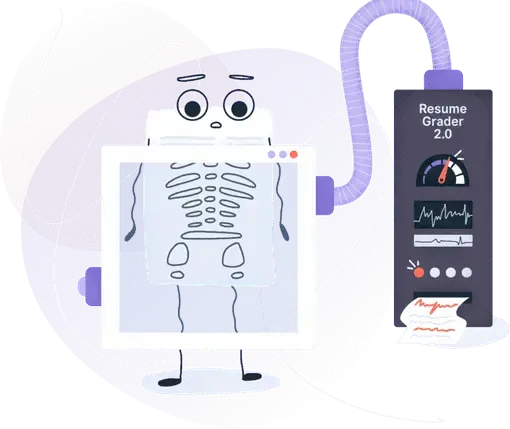Storytelling Skills: Example Usage on Resumes, Skill Set & Top Keywords in 2025
Including storytelling as a skill on your resume hints at your ability to engage and captivate, highlighting your communication expertise and creative flair. Dive into our guide below and discover fresh ways to weave storytelling into your resume, sparking the interest of potential employers.


Is your resume ATS-friendly?
Drop your resume here or upload a file to find out if the skills in your resume are readable by an ATS.
Storytelling is the art of conveying a message or a series of events in an engaging and compelling manner. This skill involves creativity, an understanding of your audience, and the ability to weave facts and emotion into a narrative that holds attention. Having the ability to tell a great story is beneficial in various professions such as marketing, writing, teaching, and leadership. It helps demonstrate creativity, communication skills, and the capacity to engage and persuade an audience.
Adding "storytelling" as a skill on your resume might not always be advantageous, especially if the job you're applying for doesn't directly require it or the claim isn't backed by specific examples. Stating that you possess this skill without any relevant experience might make it seem like a filler and reduce your resume’s credibility. Instead, you could demonstrate storytelling through clear and concise descriptions of past accomplishments, showing how you've used this skill effectively in real situations. Show, don't just tell, how you've shaped narratives to achieve goals in your past roles.
In this article, you will learn:
- What the benefits of including storytelling on your resume are.
- The potential drawbacks of listing storytelling as a skill without context or examples.
- Effective alternatives to simply stating you have storytelling skills, such as rephrasing and offering concrete instances of its application.
Misusage of storytelling on resumes
Using storytelling effectively in your resume can captivate the hiring manager and illustrate your achievements and abilities in a compelling way. However, it's crucial to balance narrative flair with concrete facts. Exaggeration or irrelevant anecdotes can distract and mislead, undermining your professionalism.
- In the summary section: "I'm a storytelling wizard who transforms dull data into captivating tales that enchant audiences across the globe." This is too vague, lacks specificity, and could be seen as overconfident.
- Within the experience section: "Used storytelling to make every company meeting an epic saga, leading to a 500% increase in team engagement." This claim is unrealistic and doesn't provide measurable results or context.
- Regarding achievements: "Awarded 'Storyteller of the Year' for weaving intricate tales around product features, resulting in universal acclaim." Without evidence or a clear connection to actual business outcomes, such a statement feels unsubstantiated and self-serving.
How to demonstrate storytelling skills on your resume
- Highlight relevant experience by describing roles where you created or contributed to compelling narratives, such as in marketing campaigns, writing projects, or video production.
- Quantify the impact of your storytelling by including statistics that show how your efforts increased engagement, sales, or audience size.
- Include any awards or recognition you've received for writing, directing, or producing content that showcases your storytelling abilities.
- Detail your ability to work in a team by mentioning collaborations with designers, writers, and other creators to produce cohesive and engaging stories.
- Exhibit your diversity in storytelling by listing different mediums you've used, such as social media, blogs, podcasts, or print publications.
Example 1: Demonstrate storytelling in the experience section
- •Led team of 8 in developing a new social media strategy that increased follower engagement by 50% within the first year.
- •Managed a budget of $500k and optimized ad spend resulting in a 30% increase in ROI over the previous fiscal year.
- •Initiated and executed a content partnership with influencers, boosting brand visibility and leading to a spike in web traffic by 40%.
- •Crafted a comprehensive SEO campaign for a major e-commerce client, elevating organic search rankings to top 3 on Google for 10+ key terms.
- •Improved website load times by 25% through code optimization and image compression techniques, enhancing user experience.
- •Analyzed user behavior to refine keyword strategy which brought a 35% increase in organic traffic within 6 months.
- •Developed an interactive e-learning platform that served 5000+ users, significantly enhancing the customer's online learning experience.
- •Implemented a responsive design framework that reduced the cross-device compatibility issues by 60%, as annotated in customer satisfaction surveys.
- •Collaborated with cross-functional teams to integrate a new payment system that decreased transaction abandonment by 20%.
- This example highlights relevant achievements in each position, focusing on how specific actions led to measurable results.
- Detailing contributions to larger business goals shows a clear connection between the work performed and its impact on the company's success.
- Each bullet point tells a mini-story of a challenge faced, the action taken, and the outcome achieved, making it easier for potential employers to visualize the candidate's role.
- The description avoids generic buzzwords by using concrete data and project examples, providing a straightforward account of the applicant's capabilities.
- Variety in language and structure of bullet points keeps the reader's interest and ensures that each job experience feels distinct and well-rounded.
Example 2: Demonstrate storytelling in the summary section
- Clear demonstration of experience: The summary starts by stating the exact number of years of experience, which is crucial for recruiters to assess the candidate's expertise at a glance.
- Detailed technical skills: Rather than using general terms, the applicant specifies expertise in Java, SQL, and cloud services, which shows a clear understanding of the role's demands.
- Highlighting a major achievement: Mentioning a specific accomplishment, such as leading a project that increased efficiency by 30%, offers concrete evidence of the applicant's capabilities.
- Enthusiasm and commitment: Expressing a genuine eagerness for tackling technical problems and a dedication to quality work signals a strong alignment with performance-centered cultures.
- No cliches or buzzwords: The summary avoids overused phrases and instead opts for straightforward language that conveys the facts clearly.
Example 3: Demonstrate storytelling in the achievements section
- The achievements clearly state quantifiable results, such as "Exceeded Sales Goals by 150%" which implies a high level of performance.
- Use of specific examples, like "Implemented a new inventory management system," shows practical problem-solving abilities.
- Action verbs like "Led," "Implemented," and "Spearheaded" demonstrate leadership and initiative.
- By avoiding jargon, the achievements are easy to understand, conveying the candidate's accomplishments in simple terms.
- Including a mix of team and individual successes shows the ability to thrive in collaborative and independent roles.
What are the relevant certifications for storytelling skills on resume
Certifications in storytelling can elevate your communication abilities, making your narrative delivery more engaging and effective.
The top 5 certifications for gaining storytelling skills expertise:
Top skills people add together with storytelling skill on resume:
Copywriting
Content Creation
Public Speaking
Creative Writing
Digital Marketing
Video Production
Graphic Design
Social Media Management
Brand Strategy
SEO
Communication
Persuasion
Creativity
Empathy
Active Listening
Presentation
Collaboration
Adaptability
Emotional Intelligence
Leadership
Problem Solving
Most relevant jobs for storytelling skills
Storytelling is a powerful communication tool that is key in numerous professions. It can captivate audiences, simplify complex information, and create memorable messages that resonate. Here are ten job titles that often depend on effective storytelling abilities:
- Marketing Manager
- Brand Strategist
- Corporate Communications Specialist
- Public Relations Professional
- Content Writer
- Advertising Copywriter
- Journalist
- Screenwriter
- Film Director
- User Experience Designer
Key takeaways
- Storytelling is a key skill for your resume that showcases your ability to convey information in an engaging and clear manner.
- Avoid misusing storytelling by staying honest and avoiding exaggeration to maintain credibility.
- Showcase storytelling on your resume by providing concrete examples of past experiences where you effectively communicated and connected with an audience.
Make one that's truly you.




